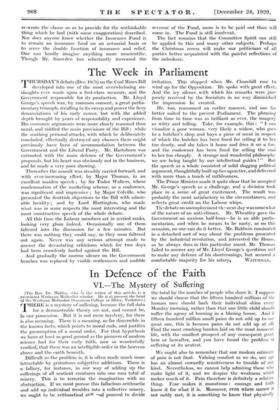The Week in Parliament T HURSDAY'S debate (Dec. 19:h) on the
Coal Mines Bill developed into one of the most overwhelming on- slaughts ever made upon a first-class measure, and the Government responsible for its production. Mr. Lloyd George's speech was, by common consent, a great parlia- mentary triumph, recalling in its sweep and power the fiery denunciations of his early career, but with the added depth brought by years of responsibility and experience. His economic arguments were more closely reasoned than usual, and riddled the main provisions of the Bill ; while the scathing personal attacks, with which he deliberately concluded, effectually destroyed any chances there might previously have been of accommodation between the Government and the Liberal Party. Mr. Hartshorn was entrusted with the main defence of the Government's proposals, but his heart was obviously not in the business, and he made a very poor showing.
Tereafter the assault was steadily carried forward, and with ever-increasing effect, by Major Thomas, in an excellent maiden speech ; by Sir Tudor Walters, whose condemnation of the marketing scheme, as a coalowner, was significant and impressive ; by Major Colville, who presented the Scottish objections to the Bill with admir- able lucidity ; and by Lord Hartington, who made what was in some respects the most interesting and the most constructive speech of the whole debate.
All this time the Labour members sat in serried ranks, looking very glum indeed. Occasionally one of them faltered into the discussion for a few minutes. But there was nothing they could say, so they soon faltered out again. Never was any serious attempt made to answer the devastating criticisms which for two days had been ceaselessly hurled against the Bill.
And gradually the morose silence on the Government benches was replaced by visible restlessness and audible irritation. This stopped when Mr. Churchill rose to wind up for the Opposition. He spoke with great effect. And the icy silence with which his remarks were pur- posely received by the Socialists in no way diminished the impression he created.
He, too, reassumed an earlier manner, and one far better suited to the present Parliament. The phrasing from time to time was as brilliant as ever, the imagery as witty and telling. Take, for example, this : " I can visualize a poor woman, very likely a widow, who goes to a butcher's shop and buys a piece of meat in respect of which the butcher has been fined for selling it to her too dearly, and she takes it home and fries it on a fire, and the coalowner has been fined for selling the coal to her too cheaply. A strange and wonderful philosophy we are being taught by our intellectual guides ! " But the speech as a whole consisted of solid slogging political argument, thoughtfully built up tier upon tier, and delivered with more than a touch of ruthlessness.
The Prime Minister made it quite clear that he accepted Mr. George's speech as a challenge, and a division took place in a scene of great excitement. The result was probably the most satisfactory in the circumstances, and reflects great credit on the Labour whips.
The debate on unemployment the next day was somewhat of the nature of an anti-climax. Mr. Wheatley gave the Government an anxious half-hour—he is an able parlia- mentarian, and when he means. to be nasty, as on, this occasion, no one can do it better. Mr. Baldwin ruminated in a detached sort of way about the problems presented by the industrial revolution, and- interested the House, as he always does in this particular mood. Mr. Thomas failed to answer any of Mr. Lloyd George's questions and to make any defence of his shortcoMings, but secured a comfortable majority for his salary; WATCHMAN.
































 Previous page
Previous page